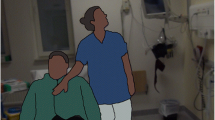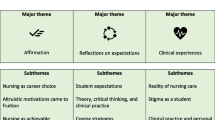Abstract
There has been a proliferation of taught masters’ degrees for nurses in recent years, and like masters’ programmes in other disciplines, the aspirations of such educational endeavours are far from unanimous. This article reports on part of a wider study, and focuses on a qualitative analysis of the perspectives of two key sets of stakeholders, namely academic education providers, and senior clinical nursing personnel, on masters’ education for nurses. Fifteen participants were interviewed in depth, and data were subjected to a qualitative content analysis. Findings indicated that while both sets of participants invoked the discourse of the ‘knowledgeable doer’, that is, the notion of amalgamating a high level of theoretical knowledge with practical know how, there were also differences in how each group deployed this discourse. Academics tended to emphasise the ‘knowing that’ or theoretical aspect of the discourse, whereas those in senior clinical roles adduced the practical component more strongly. We argue that the discourse of the ‘knowledgeable doer’ is far from stable, unified and universally agreed, but rather comprises competing elements with some emphasised over others according to the subject position of the particular individual. We locate the diverse perspectives of the two sets of stakeholders within debates about the status of masters’ programmes in relation to vocational and liberal education.
Similar content being viewed by others
Notes
‘Knowing how’ refers to the practical knowledge needed to accomplish instrumental tasks, while ‘knowing that’ depicts a theoretical knowledge of a subject.
References
Astin, A. (1993). What matters in college: Four critical years revisited. San Francisco: Jossey-Bass.
Atkins, M., & Redley, M. (1998). The assurance of standards at master’s level: An empirical investigation. Higher Education Quarterly, 52(4), 378–393.
Barnett, R. (1994). The limits of competence: Knowledge, higher education and society. Buckingham: OUP.
Byrne, B. (2004). Qualitative interviewing. In C. Seale (Ed.), Researching society and culture (2nd ed., pp. 179–192). London: Sage.
Drennan, J., & Hyde, A. (in press). Controlling response shift bias: The use of the retrospective pre-test design in the evaluation of a master’s programme. Assessment and evaluation in higher education.
Drennan, J. (2007). An evaluation of masters in nursing programmes in the Republic of Ireland: The impact of inputs and processes on graduate outcomes. Unpublished PhD thesis, University College Dublin, Ireland.
Dressel, P. (1976). Handbook of academic evaluation. San Francisco: Jossey-Bass.
Estabrooks, C. (1999). The conceptual structure of research utilization. Research in Nursing and Health, 22, 203–216.
Estabrooks, C. (2001). Research utilization and qualitative research. In J. M. Morse, J. M. Swanson, & A. J. Kuzel (Eds.), The nature of qualitative evidence (pp. 275–298). Sage: Thousand Oaks, CA.
Glazer, J. (1988). The master’s degree. Washington DC: ERIC Digest, ERIC Clearinghouse on Higher Education.
Higher Education Authority (2006). Higher education: Key facts and figures 04/05. Dublin: Higher Education Authority.
Holdaway, E. (1997). Quality issues in postgraduate education. In R. Burgess (Ed.), Beyond the first degree (pp. 60–78). Buckingham: Society for Research into Higher Education/Open University Press.
Hsieh, H.-F., & Shannon, S. E. (2005). Three approaches to qualitative content analysis. Qualitative Health Research, 15(9), 1277–1288.
Hunter, K. M. (1989). A science of individuals: Medicine and casuistry. Journal of Medicine and Philosophy, 14, 193–212.
Joint Quality Initiative (2004a). Shared Dublin descriptors for the bachelor’s, master’s and doctoral awards accessed 2nd July 2005 at http://www.jointquality.org/content/ireland/Shared/
Joint Quality Initiative (2004b). Shared Dublin descriptors for short cycle, first cycle, second cycle and third cycle awards accessed 2nd July 2005 at http://www.jointquality.org/content/ireland/Shared/
Knight, P. (1997a). Learning, teaching and curriculum in taught master’s courses In P. Knight (Ed.), Masterclass: Learning, teaching and curriculum in taught master’s degrees (pp. 1–15). London: Cassell Education.
Knight, P. (1997b). Conclusion: Diversity, markets, regulation and equity. In P. Knight (Ed.), Masterclass: Learning, teaching and curriculum in taught master’s degrees (pp. 149–160). London: Cassell Education.
LaPidus, J. (1997). Issues and themes in postgraduate education in the United States. In R. Burgess (Ed.), Beyond the first degree (pp. 21–39). Buckingham: Society for Research into Higher Education/Open University Press.
Marks, A. (1999). Really useful knowledge: The new vocationalism in higher education and its consequences for mature students. British Journal of Educational Studies, 47(2), 157–169.
McInnis , C., James, R., & Morris, A. (1995). The masters degree by coursework: Growth diversity and quality assurance. DETYA [EIP 95/6], Canberra.
Mitchell, T. (2001). The role of the university in the twenty-first century. In A. Hoey-Heffron & J. Heffron (Eds.), Beyond the ivory tower: The university in the new millennium (pp. 33–44). Cork: Mercier Press.
Morse, J. (1991). Strategies for sampling. In J. Morse (Ed.), Qualitative nursing research: A contemporary dialogue (pp. 127–145). Newbury Park: Sage.
Mulholland, J. (1997). Assimilating sociology: Critical reflections on the ‘sociology in nursing’ debate. Journal of Advanced Nursing, 25(4), 844–852.
Newman , J. H. ([1852] 1996). The idea of a university. New Haven: Yale University Press.
Nieswiadomy, R. M. (2008). Foundations of nursing research (5th ed.). Upper Saddle River, NJ: Pearson Prentice Hall.
Patton, M. Q. (1990). Qualitative evaluation and research methods. Newbury Park: Sage.
Porter, S. (1995). Sociology and the nursing curriculum: A defence. Journal of Advanced Nursing, 21, 269–274.
Reid, I., Rennie, L., & Shortland-Jones, B. (2003). Best practice in professional postgraduate coursework: Report of an investigation commissioned by the Australian universities teaching committee. Australian universities teaching committee/Curtin University of technology.
Ryle, G. (1949). The concept of mind. London: Hutchinson.
Sandelowski, M. (2004). Using qualitative research. Qualitative Health Research, 14(10), 1366–1386.
Sharp, K. (1994). Sociology and the nursing curriculum: A note of caution. Journal of Advanced Nursing, 20, 391–395.
Smith, C. P. (2000). Content analysis and narrative. In H. T. Reis & C. M. Judd (Eds.), Handbook of research methods in social and personality psychology. Cambridge, UK: Cambridge University Press.
Symes, C. (2000). ‘Real world’ education: the vocationalization of the university. In C. Symes & J. McIntyre (Eds.), Working knowledge: The new vocationalism and higher education (pp. 30–46). Buckingham: OUP.
Thorne, P. (1997). Standards and quality in taught master’s programmes. In P. Knight (Ed.), Masterclass: Learning, teaching and curriculum in taught master’s degrees (pp. 16–27). London: Cassell Education.
United Kingdom Central Council for Nursing, Midwifery and Health Visiting (1986). Project 2000: A new preparation for practice UKCC. London.
Wilkinson, S. (2004). Focus group research. In D. Silverman (Ed.), Qualitative research: theory, method and practice (pp. 177–199). London: Sage.
Williams, K. (1994). Vocationalism and liberal education: Exploring the tensions. Journal of the Philosophy of Education, 28(1), 89–100.
Author information
Authors and Affiliations
Corresponding author
Rights and permissions
About this article
Cite this article
Drennan, J., Hyde, A. The fragmented discourse of the ‘knowledgeable doer’: nursing academics’ and nurse managers’ perspectives on a master’s education for nurses. Adv in Health Sci Educ 14, 173–186 (2009). https://doi.org/10.1007/s10459-008-9102-x
Received:
Accepted:
Published:
Issue Date:
DOI: https://doi.org/10.1007/s10459-008-9102-x




